|
|
|
Sort Order |
|
|
|
Items / Page
|
|
|
|
|
|
|
| Srl | Item |
| 1 |
ID:
188991
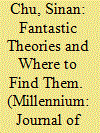

|
|
|
|
|
| Summary/Abstract |
How can we appreciate non-Western agency in theorising world politics without reintroducing parochialism and exceptionalism, thus reproducing the very problem that motivated global international relations (IR) in the first place? In this article, I explore an alternative approach to engaging with non-Western IR theories, which I refer to as the embedded observer approach. First, taking the scholarship on Chinese IR as an example, I argue that the present predicament of global IR is in part attributable to the way scholars engage with non-Western political thought. Drawing from discussions in critical IR and Comparative Political Theory, I propose a methodological adjustment for the study of non-Western theories. Specifically, I argue that by shifting focus from isolated scholars and texts to critical dialogues among autochthonous intellectuals, the researcher has the chance to learn about and appreciate the clashes of ideas, analytical perspectives, and methodological tools that together constitute the living intellectual tradition in a non-Western society. As a demonstration, I analyse the People’s Republic of China (PRC) scholars’ critical reaction to Zhao Tingyang’s Tianxia System through the lens of three key topics in the debate over the thesis. The discussion highlights the need to rethink interlocutors in global IR and the utility of an embedded observer approach for engaging with knowledge traditions beyond the West, both in IR and beyond.
|
|
|
|
|
|
|
|
|
|
|
|
|
|
|
|
| 2 |
ID:
188994
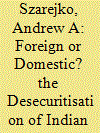

|
|
|
|
|
| Summary/Abstract |
Is securitisation normatively undesirable? Many scholars who have studied this process by which issues come to be treated as pertaining to ‘security’ have argued that it is indeed preferable to keep as many issues as possible from being securitised. Rather, most issues ought to remain politicised such that they are seen as the legitimate subject of public debate. By contrast, I argue that we ought not to ascribe any inherent moral valence to securitisation or the reverse process of desecuritisation. Instead, each attempt to (de)securitise an issue ought to be debated on its own terms. To support my argument for the moral ambiguity of (de)securitisation, I examine the US Senate’s debate over whether to transfer the Bureau of Indian Affairs from the Department of War to a new Department of the Interior in 1849. I argue that this is an inflection point in a longer desecuritising process by which the United States – acting on a presumed hierarchy – coercively assimilated Native nations into its domestic political order. I conclude that scholars should not discard (de)securitisation as an analytical tool but can instead use work on (de)securitisation to inform public debate on the likely consequences of any particular (de)securitising move, thereby serving a chastening role in public discourse.
|
|
|
|
|
|
|
|
|
|
|
|
|
|
|
|
| 3 |
ID:
188988
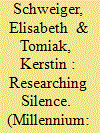

|
|
|
|
|
| Summary/Abstract |
The role of silence has received increasing attention in International Relations, ranging from silence as exclusion to secrecy and performance. Yet, there has been little effort to draw together a more practical, methodological inquiry into silence and how to engage with it in the research processes. This article builds on existing studies on silence and our own research experiences in conducting interviews and text analysis to interrogate the role silence plays in the research process. It aims to develop methodological tools for engaging with silence and offers a practical guide to analysing it from the data generation stage to the interpretation of silence. In doing so, it also contributes to attempts to redefine the meaning of silence in International Relations by including silence as more than an absence.
|
|
|
|
|
|
|
|
|
|
|
|
|
|
|
|
| 4 |
ID:
188987


|
|
|
|
|
| Summary/Abstract |
How can Indigenous law-making affect state authority? I examine this in the context of Canada’s extractive sector, where I question how and when Indigenous laws prevail over state laws to challenge colonial authority and reassert Indigenous self-determination. Although the state claims supreme authority, Indigenous governments are enacting their own laws, laws that are sometimes in tension with those of the state. I demonstrate that while the state usually responds to contentious Indigenous law-making with conflict, under certain conditions Indigenous communities can incite the state to reverse its position to one of acquiescence or cooperation. By drawing on insights from three Indigenous communities in Canada, I offer four conditions under which Indigenous peoples and governments may be able to compel the state to relent and accrue authority, including by preparing to engage in a long-term project, by fomenting community cohesion, by exploiting evolving international norms related to Indigenous rights, and by offering viable governance alternatives to colonial legislation. By highlighting new sites of authority and resistance, this work underscores the transformative possibilities of Indigenous politics.
|
|
|
|
|
|
|
|
|
|
|
|
|
|
|
|
| 5 |
ID:
188992
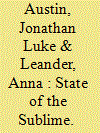

|
|
|
|
|
| Summary/Abstract |
Security politics is everywhere, its tendrils entangled with every aspect of life. Nonetheless, this hyper-securitised status quo has not interrupted the flow of everyday life, nor the circulation of people, goods, or ideas. For the privileged of the world, a paradox has emerged: war, terrorism, ecological disaster, pandemics, and many other ‘monstrous’ forms of insecurity are now experienced as mundane and manageable phenomena in spite of the exceptional political measures, and more generalised affective states of fear and anxiety, that they have proliferated. How has this occurred? This article argues that aesthetic processes and politics are fundamental to the maintenance of this paradox. To do so, we draw on Bruno Latour’s concept of ‘transfrayeurs’ (trans-fears) to understand how modes of aesthetic design are deployed to simultaneously locate sublime imaginaries of insecurity in our midst while also allowing us to live with, accept, and forget their presence. More specifically, we suggest that trans-fearing is achieved through ‘aesthetic protocols’ that specify principles for designing material, affective, and discursive forms into our lives in ways that allow for the careful ‘calibration’ of how we (unequally) experience a hierarchised, depoliticised, and militarised ‘state of the sublime’ within global security politics.
|
|
|
|
|
|
|
|
|
|
|
|
|
|
|
|
| 6 |
ID:
188990
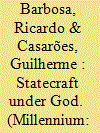

|
|
|
|
|
| Summary/Abstract |
Using Brazil as a case study, we examine ways in which radical right activists and leaders actively participate in world politics through religious nationalist narratives which operate on both national and transnational levels. We propose the existence of a particular subcategory of populist radical right (PRR) politics, which we call religious-populist radical right. Our argument is divided into three parts. First, we argue that religion provides ideational and material capabilities that have allowed the PRR to capture state institutions through elections. Second, we claim that once in power, the PRR’s governing strategy is conducted through transnational culture wars with religious overtones. Third, we argue that the PRR establishes novel patterns of international alliances to advance their vision of a new world order based on independent ethno-religious communities. By exploring the entanglements between the PRR and religious nationalism, we conclude that religion provides the radical right with the ideas, means, and social power to transform both state forms and world orders.
|
|
|
|
|
|
|
|
|
|
|
|
|
|
|
|
| 7 |
ID:
188993


|
|
|
|
|
| Summary/Abstract |
In 2004, Anna Agathangelou and L.H.M. Ling wrote their important intervention, entitled ‘The House of IR: From Family Power Politics to the Poises of Worldism,’ that ordered various theories of International Relations within an analogy of a colonial household, calling instead for a Worldism that builds communities based on interests and support. One glaring omission from this analysis, however, is mention of indigeneity. Increasingly, in North America, the experiences of Indigenous peoples are shaping national imaginations and popular political discourses – take for instance Idle No More, the Truth and Reconciliation Commission of Canada, Standing Rock, and Mauna Kea, to name a few. These shifts seen at a national level in North America, however, are not fully reflected in the field of IR. In fact, it would be easy to conclude that the field of IR has largely ignored Indigenous lived-experience. To this, this article asks how IR theorising, practice, and pedagogy could be significantly transformed by taking seriously Indigenous experiences and knowledge? To explore this question, this article explores the two central IR concepts of power and sovereignty to illustrate how the meanings and practices of these concepts are significantly furthered by attention to Indigenous experiences, practices, and knowledge. It concludes by asserting that an Indigenous approach to IR would not only be a mechanism for incisive analysis and critique of dominant constructions within the field, but also could provide an emergent space for (re)imagining collective futures across race and difference – something sorely needed in a world of ever increasing uncertainty.
|
|
|
|
|
|
|
|
|
|
|
|
|
|
|
|
| 8 |
ID:
188995
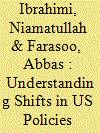

|
|
|
|
|
| Summary/Abstract |
The ‘war on terror’ produced discourses, which elevated terrorism as a primary threat to international peace and security and justified the overthrow of regimes that were suspected of supporting terrorism. After two decades, the United States (US) seeks to wind down the war, including through negotiations with groups that it once regarded as terrorist or complicit in terrorism. This article takes a critical approach to examine these shifts in US policy in relation to the Taliban in Afghanistan. It conceives the Taliban as a networked movement that consisted of local roots, transnational jihadist ties and connections to Pakistan’s proxy war in Afghanistan. The article then identifies and problematises key assumptions of American discourses by assessing them against local patterns of terrorism and (in)security and the Taliban’s violent tactics. Drawing on US sources, it finds that the US discourses shifted over time between various aspects of the Taliban movement as signifiers of its identity to justify shifting Washington’s priorities in Afghanistan. These discursive shifts, which reflected US policy priorities, introduced uncertainties and contradictions that contributed to the failure of the war efforts in Afghanistan.
|
|
|
|
|
|
|
|
|
|
|
|
|
|
|
|
| 9 |
ID:
188989


|
|
|
|
|
| Summary/Abstract |
Zoonotic pandemics shine an uncomfortable light on how human lifeways facilitate the sharing of pathogens across species. Yet our lack of acknowledgement of our shared vulnerability with those non-human animals we raise or hunt to kill and eat, whose habitats we encroach upon and destroy, whose populations we undermine and threaten, has led us to the current human health crisis. The predominant political response to zoonotic pandemic has been bordering practices of surveillance, securitisation and bodily separation. These practices reflect intra-human and species hierarchies. They also fail to acknowledge the extent to which the boundaries of species are leaky, and are continually breached. A posthumanist zoonotic politics seeks not to attempt to border the leaky boundaries of species, but rather to insist on a re-ordering of species relations towards less exploitative and extractive ways of sharing the planet with the myriad creatures that constitute our world.
|
|
|
|
|
|
|
|
|
|
|
|
|
|
|
|
|
|
|
|
|